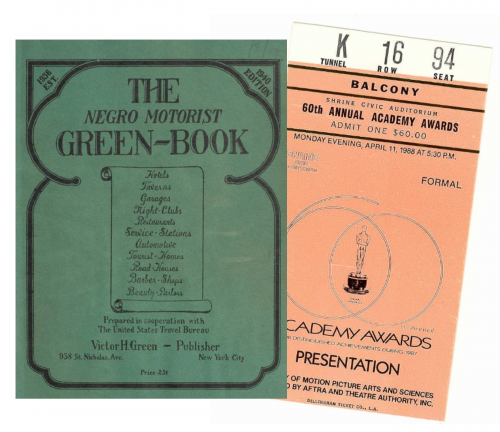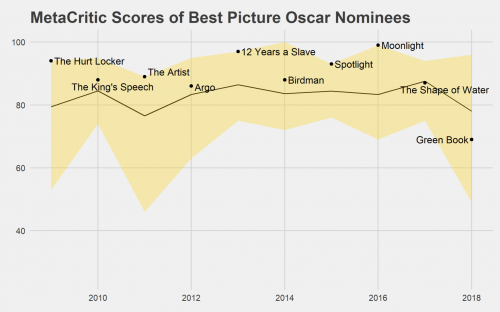Last month, Green Book won Best Picture at the 91st Academy Awards. The movie tells the based-on-a-true-story of Tony Lip, a white working-class bouncer from the Bronx, who is hired to drive world-class classical pianist Dr. Don Shirley on a tour of performances in the early-1960s Deep South. Shirley and Lip butt heads over their differences, encounter Jim Crow-era racism, and, ultimately, form an unlikely friendship. With period-perfect art direction and top-notch actors in Mahershala Ali and Viggo Mortensen, the movie is competently-crafted and performed fairly well at the box office.
Still, the movie has also been controversial for at least two reasons. First, many critics have pointed out that the movie paints a too simple account of racism and racial inequality and positions them as problem in a long ago past. New York Times movie critic Wesley Morris has called Green Book the latest in a long line of “racial reconciliation fantasy” films that have gone on to be honored at the Oscars.
But Green Book stands out for another reason. It’s an unlikely movie to win the Best Picture because, well, it’s just not very good.

Sociologists have long been interested in how Hollywood movies represent society and which types of movies the Academy does and doesn’t reward. Matthew Hughey, for example, has noted the overwhelming whiteness of Oscar award winners at the Oscars, despite the Oscars A2020 initiative aimed at improving the diversity of the Academy by 2020. But, as Maryann Erigha shows, the limited number of people of color winning at the Oscars reflects, in part, the broader under-representation and exclusion of people of color in Hollywood.
Apart from race, past research by Gabriel Rossman and Oliver Schilke has found that the Oscars tend to favor certain genres like dramas, period pieces, and movies about media workers (e.g., artists, journalists, musicians). Most winners are released in the final few months of the year and have actors or directors with multiple prior nominations. According to these considerations, Green Book had a lot going for it. Released during the holiday season, it is a historical movie about a musician, co-starring a prior Oscar winner and a prior multiple time Oscar nominee. Sounds like perfect Oscar bait.
And, yet, quality matters, too. It’s supposed to be the Best Picture after all. The problem is what makes a movie “good” is both socially-constructed and a matter of opinion. Most studies that examine questions related to movies measure quality using the average of film critics’ reviews. Sites like Metacritic compile these reviews and produce composite scores on a scale from 0 (the worst reviewed movie) to 100 (the best reviewed movie). Of course, critics’ preferences sometimes diverge from popular tastes (see: the ongoing box office success of the Transformers movies, despite being vigorously panned by critics). Still, movies with higher Metacritic scores tend to do better at the box office, holding all else constant.
If more critically-acclaimed movies do better at the box office, how does quality (or at least the average of critical opinion) translate into Academy Awards? It is certainly true that Oscar nominees tend to have higher Metacritic scores than the wider population of award-eligible movies. But the nominees are certainly not just a list of the most critically-acclaimed movies of the year. Among the films eligible for this year’s awards, movies like The Rider, Cold War, Eight Grade, The Death of Stalin, and even Paddington 2 all had higher Metacritic scores than most of the Best Picture nominees. So, while nominated movies tend to be better than most movies, they are not necessarily the “best” in the eyes of the critics.
Even among the nominees, it is not the case that the most critically-acclaimed movie always wins. In the plot below, I chart the range of Metacritic scores of the Oscars nominees since the Academy Awards reinvented the category in 2009 (by expanding the number of nominees and changing the voting method). The top of the golden area represents the highest-rated movie in the pool of nominees and the bottom represents the worst-rated film. The line captures the average of the pool of nominees and the dots point out each year’s winner.

As we can see, the most critically-acclaimed movie doesn’t always win, but the Best Picture is usually above the average of the pool of nominees. What makes Green Book really unusual as a Best Picture winner is that it’s well below the average of this year’s pool and the worst winner since 2009. Moreover, according to MetaCritic (and LA Times’ film critic Justin Chang), Green Book is the worst winner since Crash in 2005.
Green Book’s Best Picture win has led to some renewed calls to reconsider the Academy’s ranked choice voting system in which voters indicate the order of preferences rather than voting for a single movie. The irony is that when Moonlight, a highly critically-acclaimed movie with an all-black cast, won in 2016, that win was seen as a victory made possible by ranked choice voting. Now, in 2019, we have a racially-controversial and unusually weak Best Picture winner that took home the award because it appears to have been the “least disliked” movie in the pool.
The debate over ranked choice voting for the Academy Awards may ultimately end in further voting rule changes. Until then, we should regard a relatively weak movie like Green Book winning Best Picture as the exception to the rule.
Andrew M. Lindner is an Associate Professor at Skidmore College. His research interests include media sociology, political sociology, and sociology of sport.

Comments 22
mjl2181 — March 20, 2019
Well-written article. I wish Green Book would have taken a more nuanced approach to unearthing the complex and dynamic relationship between Italian-Americans and Blacks during the volatile 1960s. Tony Lip certainly embodied some of those stereotypical qualities of the Italian-American caricature so ingrained in our media culture but I think this movie missed its chance to illustrate the more intricate aspects of the Italian-American experience.
Thania Montana — April 23, 2019
Well written. I think, ‘ Green Book’ has grabbed the Oscar just for its storytelling. The Italian-American racism against the Black has been picturized in this film perfectly that people want to see. Being a story writer, I know what actually attract the mass people. Even when I write for https://australianwritings.com.au/ I try to keep the real story in my writing so that people compel to believe it. In fact, people like to read or see a real story.
Sylvia Jackson — April 23, 2019
Excellent Post! I am very glad to read this good article. I think, this green book has grabbed the Oscar just for its storytelling. The Italian-American racism against the Black has been picturized in this film perfectly that people want to see. As a story writer, I know what actually attract the mass people. Even when I write for https://australianwritings.com.au/ I try to keep the real story in my writing so that people compel to believe it. In fact, people like to read or see a real story. Anyway, Thank you for sharing this great information with us.
driversin — May 1, 2019
One of the best information website thank you for sharing info..https//www.driversin.com
aos tv — May 12, 2019
Yes, I too watched the movie and just loved it.
Dr. Andrew Joseph Pegoda — May 29, 2019
This genre of film is what my a good part of my research focuses on. To me, one of the strangest and most problematic aspects of GREEN BOOK is that it's not actually about the The Negro Motorist Green Book that helped Black people survive. It was an important part of intragroup agency. Why, then, did the "powers at be" name it "GREEN BOOK"?
James Bondela — September 4, 2019
I also loved Green Book movie and it's direction was next level, by the way if you need web development services in Australia, visit https://www.australiawebdevelopment.com/
Martha — October 27, 2019
Good post about The Oscars! I love the movies!
Jonathan Simon — January 31, 2020
This is a very good film and an amazing book, you should watch this film for sure, I also think that students should concentrate on the educational process and read more books, for example, Shakespeare’s book about Macbeth, a very good book, an analytical essay you can read on our site https://tooly.io/macbeth/. This will help you develop and be recognized in the current situation in the world.
Barbara S. McDonald — March 20, 2020
Great movie! I really liked him. And the article is wonderful, it describes everything well!
sergio — June 6, 2020
Es una aplicación que te ofrece una valiosa y genial opción que te permite encontrar de manera fácil series y películas con una eficiente calidad de video.
Esta aplicación de Streaming Online
bestessaytyper.com/buy-college-essays-online — December 27, 2020
A very interesting article and as a marketer I also learned a lot. I'm in the process of promotion my own site right now, so the information in this blog will be of interest to me! I wish you good luck!
Andrew — February 11, 2021
Oscar-Winning is not an easy task, I am glad that you share the beautiful information with us,why don't you get the Wiki Creation Services to make a page for your own on Wikipedia
Guanli — June 29, 2023
The book is so exciting. You should join it. The plot is so attractive, I cannot stop reading.
happy wheels
Gilbert V. Revis — May 2, 2024
From the rolling hills of Sussex, a team of stargazers joins hands with celestial pioneers - their mission: to unravel the tapestry of the cosmos https://orbitaltoday.com/2024/03/29/sussex-scientists-join-nasas-galaxy-probe-project/ This collaboration is a symphony of intellect and imagination, reaching out to the universe’s hidden corners.
uikrit — February 21, 2025
The lack of novel mechanisms, players must exercise considerable caution while navigating this level's hazards.
geometry dash lite
Ali Raza — April 15, 2025
Locksmith Wakefield provides expert, reliable service tailored to your security needs—fast, efficient, and always professional. While thinking about standout surprises, you might wonder: What Makes “Green Book” an Unusual Oscar Winner? Just like that unexpected win, finding a locksmith who exceeds expectations can be rare. Whether you’re locked out or upgrading your locks, choose a service that delivers beyond the standard—trusted by locals, ready when you need it most.
kashif kashif kashif — August 2, 2025
That are definitely excellent. Many of these tiny details are made getting lot of background knowledge. I am interested in them plenty. mexican restaurant
Bonnie Guzman — August 11, 2025
What makes green book an unusual Oscar winner is the ability to deal with the ideas and the services that bring the best solutions when we use it or information. By using resurfacing we can learn how to deal with these issues to get a solution that lasts for a longer period of time.
Anime Withcer — October 30, 2025
Their ability to deal with different ideas make it different from unusual oscar.
Janifer — December 11, 2025
I always thought Green Book stood out because it blends humor with some pretty heavy themes, which makes it an interesting pick for Best Picture. A lot of movies try to balance those elements but few hit the mark the way this one did. When I was reading more about its awards run, I came across rsvlbailbonds.com during a search, which pulled me into a whole different rabbit hole about real life justice issues.
Steve Micheal — January 13, 2026
Brands that use puns effectively often become memorable because the humor aligns with the audience’s intelligence and curiosity. In product naming, advertising slogans, and campaign messaging, Bingo Jokeshttps://punsverse.com/bingo-puns/ can elevate ordinary phrases into cultural touchpoints, which is why they remain a favorite tool for marketers worldwide.